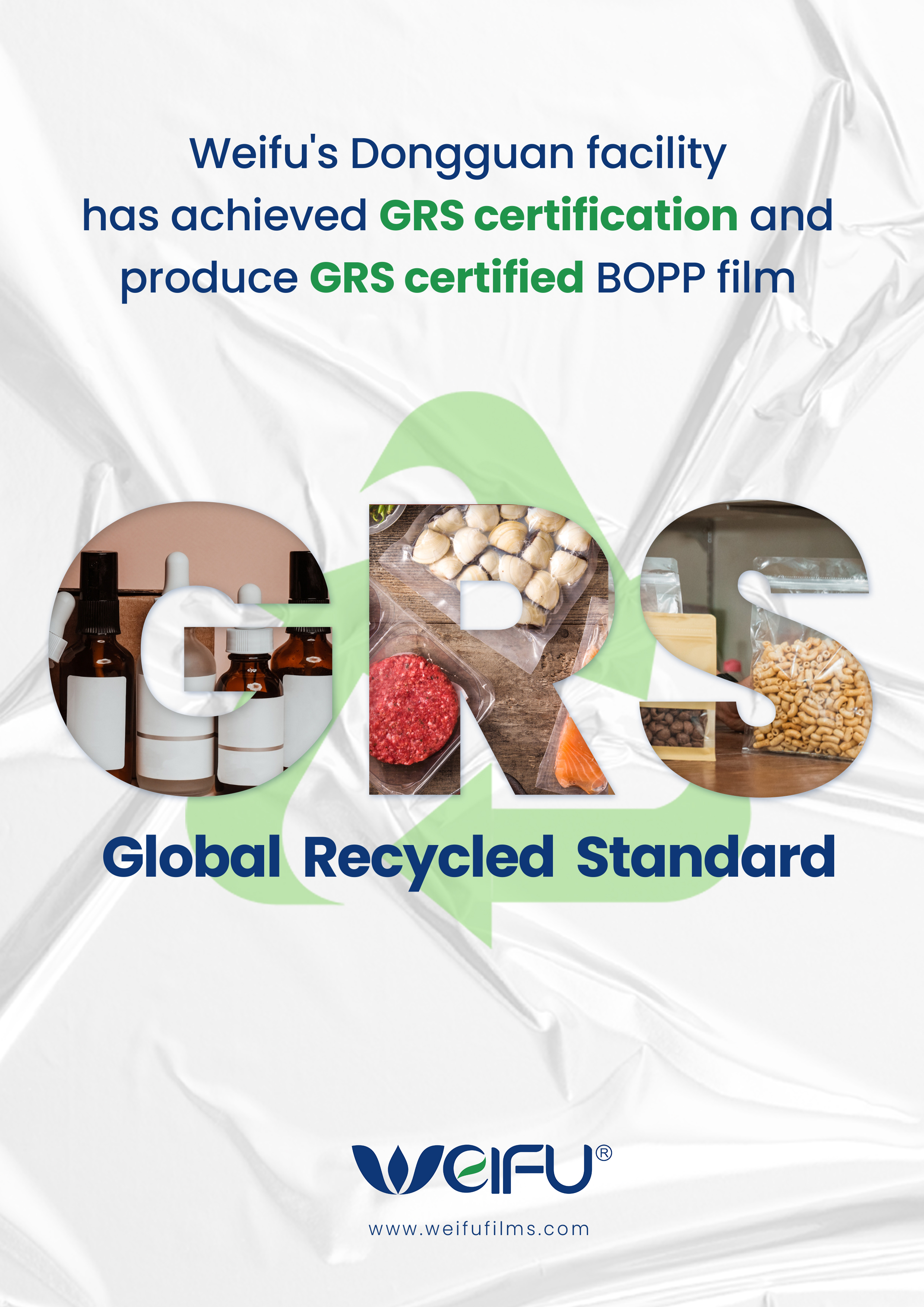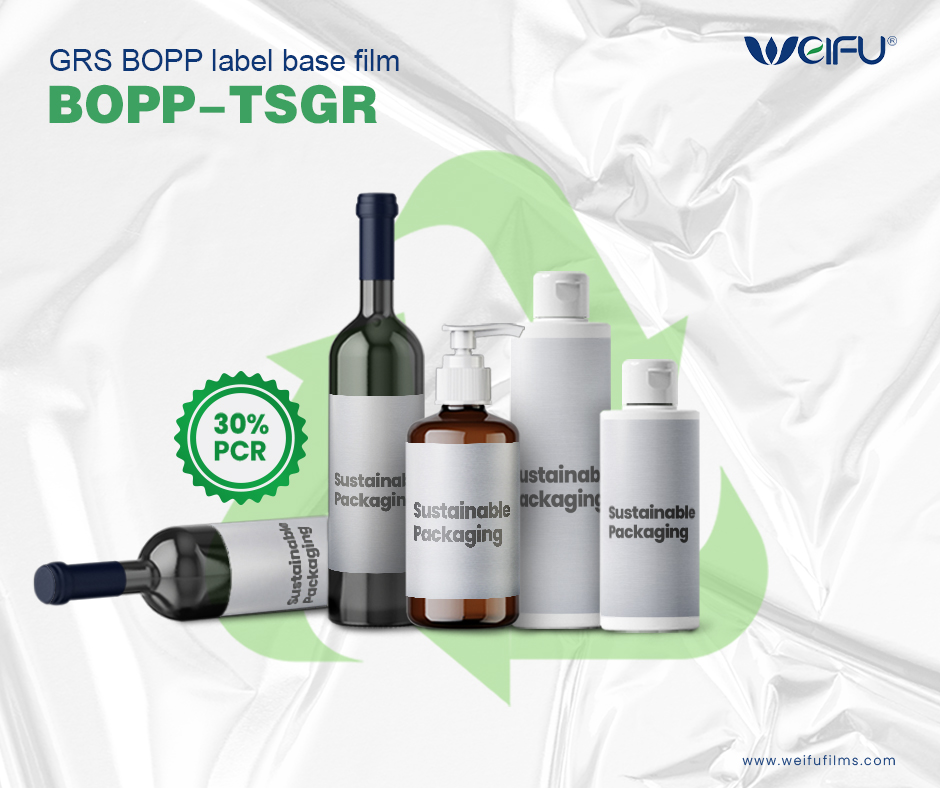2023.10.31
How Does Weifu's Label Base Film Contribute to Net-Zero Emissions?
The Paris Agreement's net-zero by 2050 target needs to slash global greenhouse gas emissions to near zero, with residual emissions offset by natural or artificial means. In the label film industry, this directive propels the modernization of sustainable production practices, including shifting to renewable energy sources for manufacturing processes, developing eco-friendly materials with lower carbon footprints, and adopting circular economy principles to decrease waste and promote recycling. Surely, this move not only supports global climate goals but also responds to the swelling demand for environmentally responsible products within the supply chain.
 Mitigating the Environmental lmpact of Labeling
Mitigating the Environmental lmpact of Labeling
The global label market is on a definite upswing, with projections estimating a CAGR of 4.9% leading up to 2033 from 2023. It is buttressed by rising demand across key sectors, like pharmaceuticals, food and beverage, and logistics, all of which are facing an uptick in label films for branding, information, and security purposes. Concurrently, there is intensifying pressure from regulatory bodies and consumer groups for the industry to mitigate its environmental footprint. The adaptation of production lines to incorporate eco-friendly materials and recycling technologies is symbolic of this shift. It reflects the market's alertness to sharp environmental consciousness.
Amid this momentum, the industry is confronting the need to address the environmental impacts of label film production and disposal. Stakeholders are inspecting the life cycle of label films, from raw material extraction to end-of-life disposal. It prompts a surge in the demand for labels derived from PCR content. This demand shapes the market and compels manufacturers to explore and adopt biodegradable, compostable, and recyclable materials that comply with environmental standards. The integration of digital printing recycling post-consumer material technologies is further refining the sustainability profile of label films for adjusted material usage and waste during the production phase.
Labeling Industry Leaders Movement and Commitment
In alignment with the global drive towards sustainability, leaders in the labelling industry are setting their strategies to contribute to the roadmap for net-zero emissions by 2050. A key element of this commitment is the announcement of PCR label films to cut the carbon footprint associated with label production and the afterlife. These novelties are not merely incremental improvements but represent a transformative step in material science and manufacturing processes within the sector.
The move to PCR label films implies a tangible movement towards circular economy models, where the reclamation and reuse of materials are central to operational methodologies. This tactical pivot reflects a harmonization of industry practices with the broader environmental objectives highlighted by the Paris Agreement and the Sustainable Development Goals.
Sustainable Packaging Solution Provider and Film Manufacturer
Weifu is at the vanguard of sustainable packaging and it manufactures films that support the Net-zero Emissions by 2050 roadmap. The company received Global Recycled Standard (GRS) certification for its BOPP and CPP lines while launching its ground-breaking PCR film materials.
- Progressive Materials in Packaging
Weifu's innovative approach is illustrated by its BOPP GRS Label Film, which incorporates 30% or more PCR content. The material not only meets inflexible environmental standards but also offers exceptional clarity and performance for labels. While integrating recycled content into the core of their label film, Weifu addresses the critical demand for sustainable packaging options without compromising the film's quality or the printing and self-adhesive label capabilities.
- Certification and Commitment
The company's allegiance to sustainability is reinforced by accomplishing Global RecycleStandard certification for its BOPP and CPP product lines. Another launch of Weifu PCR filmproduct is BOPP GRS Plain Film, with high transparency and antistatic properties, demonstratesWeifu's obligation to ground-breaking solutions that adhere to international food contact safetystandards. Weifu's technical ability is apparent in their products' advanced features, includinghigh dyne retention and compatibility with numerous printing systems. Indeed. these areessential for versatile packaging applications.

About Weifu
Established in 2000, Weifu leverages over four decades of expertise in unconventional polymer processing. The company specializes in high-grade label base film with a focus on BOPP GRS label film incorporating over 30% post-consumer recycled content. Their production capabilities are featured by a powerful quality management system, evidenced by ISO9001:2015 and ISO14001:2015 certifications, and a promise to sustainability through GRS compliance. The company's R&D proficiency is marked by innovative patents in flexible packaging film technologies, which serves a global clientele across over 20 countries with a production capability of 170,000 metric tons annually.
For more information about Weifu quality label film, contact us or visit our website.
Reference